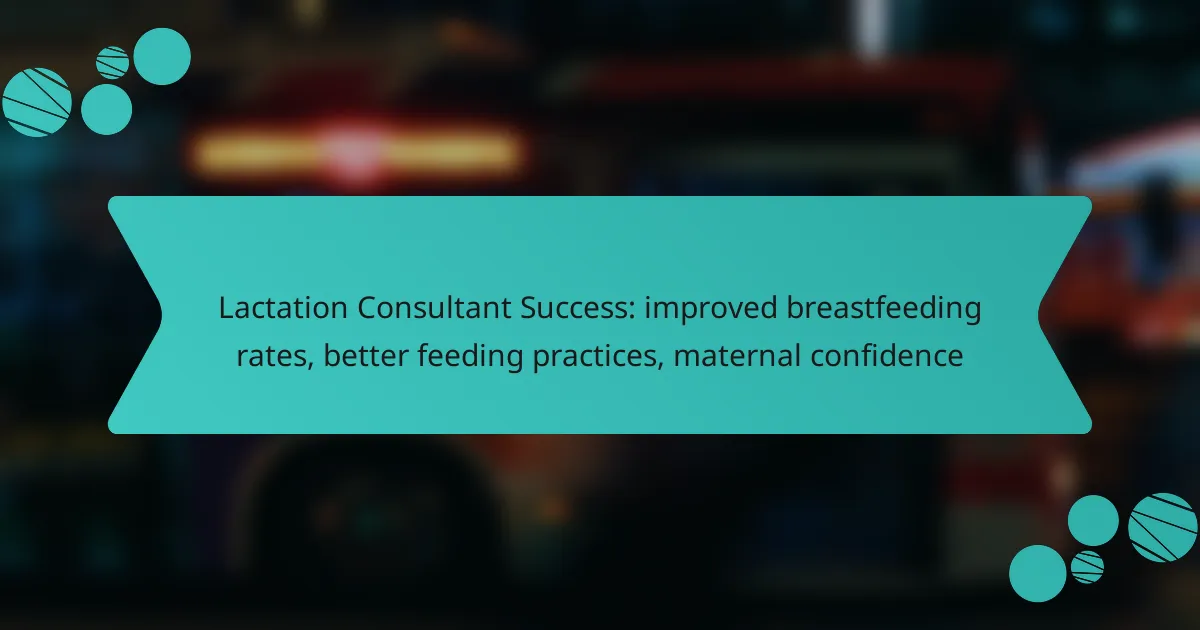Lactation consultants are essential in improving breastfeeding rates by offering personalized support and education to new mothers. Their expertise not only addresses common breastfeeding challenges but also fosters better feeding practices and enhances maternal confidence, ultimately leading to a more positive feeding experience for both mother and baby.

How can lactation consultants improve breastfeeding rates in the United States?
Lactation consultants play a crucial role in enhancing breastfeeding rates in the United States by providing tailored support and education to new mothers. Their expertise helps address common challenges, leading to improved feeding practices and increased maternal confidence.
Personalized feeding plans
Personalized feeding plans are essential for addressing the unique needs of each mother and baby. Lactation consultants assess factors such as the baby’s health, mother’s lifestyle, and any specific challenges to create a customized approach. This tailored strategy can significantly enhance breastfeeding success.
For example, a lactation consultant might recommend specific feeding schedules or techniques that align with a mother’s work commitments or health conditions. This individualized attention helps mothers feel more equipped and confident in their breastfeeding journey.
Support groups for new mothers
Support groups led by lactation consultants provide a vital space for new mothers to share experiences and challenges. These groups foster a sense of community, allowing mothers to learn from one another while receiving professional guidance. This peer support can be instrumental in maintaining breastfeeding practices.
In these settings, mothers can discuss common issues such as latch difficulties or milk supply concerns, receiving both emotional support and practical solutions. Regular attendance can lead to higher breastfeeding rates as mothers feel less isolated and more empowered.
Education on breastfeeding techniques
Education on breastfeeding techniques is a core component of a lactation consultant’s role. They teach mothers effective latching techniques, positioning strategies, and how to recognize hunger cues in their babies. This knowledge is crucial for establishing a successful breastfeeding routine.
Workshops and one-on-one sessions can cover topics such as managing pain during breastfeeding and understanding the baby’s feeding patterns. By equipping mothers with these skills, lactation consultants help build confidence and promote longer breastfeeding durations.

What are effective feeding practices promoted by lactation consultants?
Lactation consultants promote effective feeding practices that enhance breastfeeding success and maternal confidence. Key practices include skin-to-skin contact, responsive feeding methods, and proper latch techniques, all of which contribute to improved breastfeeding rates and better feeding experiences for both mother and baby.
Skin-to-skin contact
Skin-to-skin contact, or kangaroo care, involves placing the baby directly on the mother’s bare chest immediately after birth. This practice helps regulate the baby’s temperature, heart rate, and breathing while promoting bonding and initiating breastfeeding. Research indicates that early skin-to-skin contact can significantly increase breastfeeding duration and exclusivity.
To implement skin-to-skin contact effectively, ensure a warm environment and position the baby in a way that supports their natural instincts to latch. Aim for at least 60 minutes of uninterrupted contact soon after delivery, as this can set a positive tone for feeding practices in the days to follow.
Responsive feeding methods
Responsive feeding methods focus on recognizing and responding to the baby’s hunger cues rather than adhering to a strict schedule. Signs of hunger may include rooting, sucking on hands, or increased alertness. By responding promptly to these cues, mothers can foster a positive feeding relationship and encourage the baby to feed effectively.
To practice responsive feeding, mothers should be attentive and patient, allowing the baby to lead the feeding process. Avoiding rigid feeding times can help establish a more natural rhythm, which often results in better breastfeeding outcomes. Remember, each baby is unique, and their feeding needs may vary throughout the day.
Proper latch techniques
Proper latch techniques are crucial for successful breastfeeding and can prevent discomfort for the mother while ensuring the baby receives adequate nutrition. A good latch involves the baby taking a large portion of the areola into their mouth, not just the nipple, which helps facilitate effective milk transfer.
To achieve a proper latch, position the baby so their mouth is level with the nipple, and encourage them to open wide before bringing them to the breast. If the latch feels painful or the baby is not feeding well, gently break the latch by inserting a finger into the corner of the baby’s mouth and try again. Regular practice and guidance from a lactation consultant can help mothers master this essential skill.

How do lactation consultants enhance maternal confidence?
Lactation consultants play a crucial role in enhancing maternal confidence by providing personalized support and expert guidance on breastfeeding. Their tailored approach helps mothers overcome challenges, leading to improved feeding practices and a stronger sense of self-efficacy in their parenting journey.
One-on-one consultations
One-on-one consultations allow lactation consultants to address specific concerns and questions that mothers may have about breastfeeding. These personalized sessions can help identify issues such as latch difficulties or milk supply concerns, providing targeted solutions that empower mothers.
During these consultations, consultants often demonstrate techniques and offer hands-on support, which can significantly boost a mother’s confidence in her ability to breastfeed successfully. This individualized attention fosters a supportive environment where mothers feel heard and understood.
Workshops on breastfeeding challenges
Workshops focused on breastfeeding challenges provide mothers with practical strategies and peer support. These group settings encourage sharing experiences and solutions, which can alleviate feelings of isolation and anxiety related to breastfeeding.
Topics covered in these workshops may include managing common issues like engorgement, nipple pain, and feeding schedules. By learning from both experts and fellow mothers, participants can gain valuable insights that enhance their breastfeeding experience and confidence.
Access to resources and support
Lactation consultants offer access to a variety of resources that can further support breastfeeding success. This may include informational pamphlets, online resources, and referrals to local support groups or healthcare providers.
Having a wealth of resources at their disposal allows mothers to find answers to their questions and connect with others who share similar experiences. This network of support reinforces their confidence and encourages them to continue breastfeeding, knowing they are not alone in their journey.

What qualifications should you look for in a lactation consultant?
When selecting a lactation consultant, prioritize their qualifications, including certification and relevant experience. A qualified consultant can significantly enhance breastfeeding success, improve feeding practices, and boost maternal confidence.
Certification from the International Board of Lactation Consultant Examiners
Look for lactation consultants who hold certification from the International Board of Lactation Consultant Examiners (IBLCE). This certification indicates that the consultant has completed rigorous training and passed a comprehensive exam, ensuring a high standard of knowledge and practice.
IBLCE certification is recognized globally, which means that a certified consultant is likely to be well-versed in evidence-based practices. This expertise can help mothers navigate challenges and establish effective breastfeeding routines.
Experience with diverse breastfeeding scenarios
Experience is crucial when choosing a lactation consultant. Seek professionals who have worked with a variety of breastfeeding situations, including preterm infants, multiples, and mothers with specific health conditions. This breadth of experience equips them to address unique challenges that may arise.
Consultants who have encountered diverse scenarios can offer tailored advice and solutions. For instance, they might provide strategies for managing low milk supply or techniques for breastfeeding after a cesarean section. Their practical insights can make a significant difference in a mother’s breastfeeding journey.

How do local lactation consultant services vary across major cities?
Lactation consultant services differ significantly across major cities, influenced by factors such as local healthcare infrastructure, community needs, and available resources. In urban areas, access to specialized lactation support may be more robust, while rural regions might rely on fewer, more generalized services.
Availability of in-home consultations
In-home consultations are often more prevalent in larger cities, where lactation consultants can easily travel to meet new mothers. These services typically offer personalized support tailored to individual needs, which can enhance breastfeeding success rates. In contrast, smaller towns may have limited in-home options, requiring mothers to seek out clinics or hospitals for assistance.
When considering in-home consultations, check if the consultant is certified and inquire about their experience with specific challenges, such as latch issues or low milk supply. Many cities have directories or online platforms where you can find qualified lactation consultants offering in-home visits.
Community-based support programs
Community-based support programs for breastfeeding can vary widely, with some cities offering extensive resources through hospitals, health departments, and non-profit organizations. These programs often include group classes, peer support networks, and workshops that promote effective feeding practices and maternal confidence.
In larger urban areas, these programs may be funded by local health initiatives, providing free or low-cost services to families. In contrast, smaller communities might have fewer resources, making it essential for mothers to seek out local parenting groups or online forums for support. Always verify the credentials of facilitators and the quality of the programs offered.

What are the emerging trends in lactation consulting?
Emerging trends in lactation consulting focus on enhancing breastfeeding rates, improving feeding practices, and boosting maternal confidence. These trends include the integration of technology, increased accessibility to support services, and a growing emphasis on personalized care.
Telehealth services for remote support
Telehealth services are transforming lactation consulting by providing remote support to new mothers. This approach allows lactation consultants to offer guidance via video calls, phone consultations, or messaging, making it easier for mothers to access help from the comfort of their homes.
These services are particularly beneficial for mothers in rural areas or those with mobility challenges. They can receive immediate assistance with breastfeeding techniques, troubleshooting issues, and emotional support, which can significantly enhance their confidence and overall experience.
When using telehealth for lactation consulting, it’s essential to ensure a stable internet connection and a quiet environment for effective communication. Mothers should prepare by having their baby and any necessary supplies nearby, such as a breast pump or feeding log, to facilitate the consultation.
